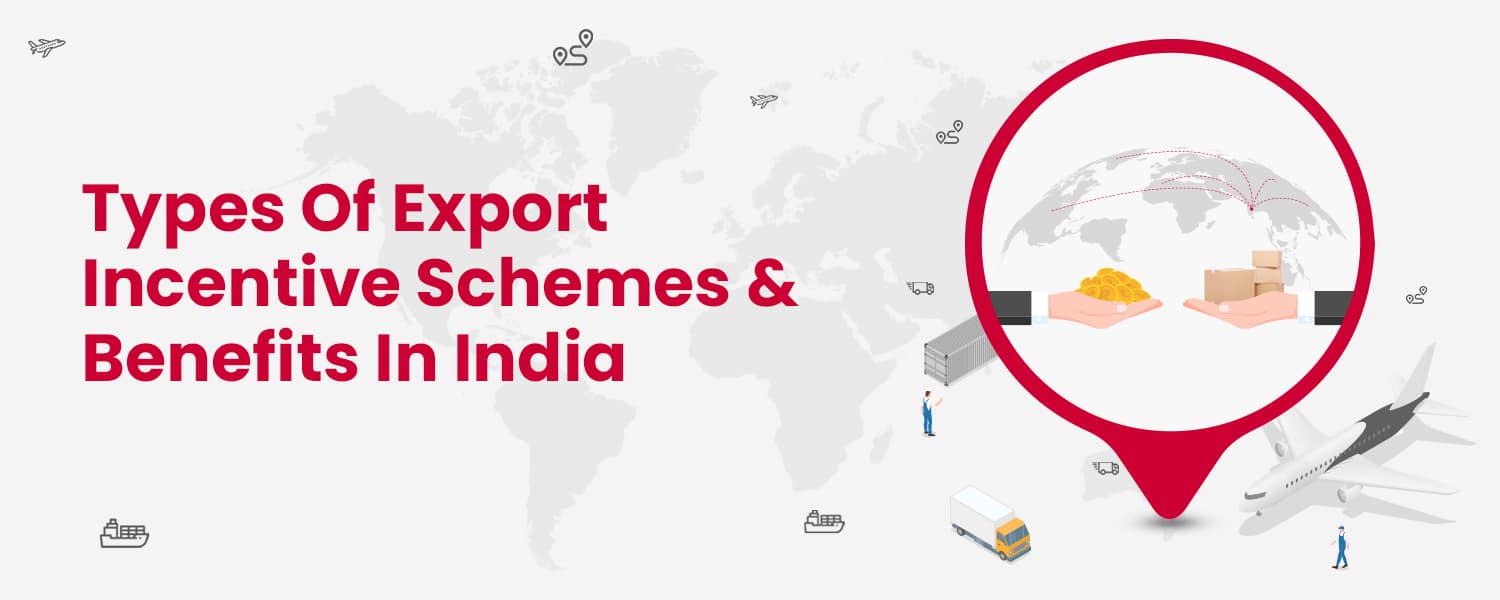Exporting goods and services is the primary source of foreign exchange earnings, which is a key component of domestic revenue. To export, you need a developed economy and the ability to produce goods attractive to foreign buyers. This means successful exporters have a significant market share within their country.
India has thousands of exporters and businesses selling internationally via various mediums, including the increasingly popular eCommerce exports. A thriving and growing India-based eCommerce market is a major outlet for this nation’s export potential.
The Indian Government aims to increase its gross domestic product (GDP) from its current $3.3 trillion to $5 trillion by 2025. To reach this goal, the country must increase its exports to $1 trillion at the same time. One way to do this is through export incentives, which offer financial and non-financial incentives for exporters. This means that every export business needs to be aware of these incentives to succeed. In this blog, you will learn about India’s different export incentive schemes and their associated benefits.
Export Incentive Schemes in India
Export incentives are a foreign exchange management measure introduced in India by the Ministry of Commerce and Industry to facilitate the expansion of exports and also to help the export sector grow. These measures include tax exemptions and duty drawbacks for companies exporting goods,
financial encouragement for small exporters and allowing them easy access to credit, identification of specific product groups for export promotion, etc.
These incentives are offered to encourage commercial growth, boost exports, achieve self-sufficiency and ensure a higher reach of local products.
Types of Export Incentives
India’s Foreign Trade Policy (FTP) 2015-20 advocates export incentives offered by the Government through the Directorate General of Foreign Trade (DGFT). Key incentives provided by the Government to achieve its goal are as follows:
Rebate of Duties & Taxes on Exported Products (RoDTEP Scheme)
The Rebate of Duties & Taxes on Exported Products (RoDTEP) scheme is one of the various export incentive schemes available to exporters in India. This scheme, which came into effect on April 1, 2020, aims to reimburse all duties and taxes manufacturers paid during the export production process.
It focuses on helping manufacturers reduce costs associated with exporting goods and services, thus boosting India’s exports.
Under this scheme, exporters can claim a rebate of duties and taxes on their exported products. The amount is calculated based on the value-added content in the product and not on its cost or sale price.
This makes it easier for exporters to understand their eligibility for duty refunds as they don’t need to take into account fluctuations in prices or exchange rates.
Service Export Incentive Scheme (SEIS)
The Service Exports from India Scheme (SEIS) is an export incentive scheme meant to promote service exports from India. It is a flagship program of the Indian Government to increase the country’s foreign exchange earnings and create employment opportunities for its citizens.
The scheme offers duty credit scrips which are redeemable against payment of customs duties on imports, as well as income tax exemption and duty drawback benefits.
Under SEIS, services such as travel, transport, construction and repair, computer-related services, and so on qualify for the scheme; however, certain specified services are not eligible. The incentive is provided in the form of a Foreign Exchange Incentive or Service Export Incentive Credit (SEIS).
This allows exporters to avail reimbursement of up to 15% of their net foreign exchange earnings in each financial year.
MEIS Export Incentive
This scheme is designed to provide rewards to exporters to offset infrastructural inefficiencies and associated prices. In addition, this scheme provides incentives to exporters by allowing them to receive credit toward future customs duties through duty credit scrips.
The MEIS rewards scheme provides incentives for exporters on the export of goods through courier or international post on consignments valued up to Rs. 5 lakh.
Duty Exemption And Remission Schemes
The Ministry of Commerce and Industry has launched two schemes to allow duty-free importation of inputs required for exporting goods. One is a duty exemption scheme, which allows for duty-free importation of inputs used in export products;
the other is a duty remission scheme, under which post-export replenishment of duties on imported inputs is provided when used in export products.
Different Categories of Duty Exemption and Remission Scheme
Duty exemption schemes consist of
Advance Authorisation Scheme (AAS)
The Advance Authorisation Scheme (AAS) is an export incentive scheme administered by the Directorate General of Foreign Trade (DGFT). It allows Indian exporters to obtain duty-free imported inputs for exports. Under this scheme,
exporters are not required to pay any duties on imported goods used as raw materials and components in their manufacturing process. This eliminates the financial burden of paying import duties, thus providing an opportunity to increase profit margins.
The AAS primarily aims at promoting export production activities and helping exporters become more competitive in the global market. Through this scheme, exporters can access duty-free imports of inputs that may not be locally available or cost-prohibitive. In addition,
exporters also benefit from faster clearance procedures and exemptions from certain taxes such as customs surcharges, sales tax, etc., allowing them to save time and money.
Duty-Free Import Authorisation Scheme
The Duty-Free Import Authorization (DFIA) Scheme is one of the most popular export incentives for duties. This scheme enables Indian exporters to import inputs and capital goods without payment of basic customs duty, Additional Customs Duty, or Countervailing Duty. Such benefits allow business owners to save significantly on production costs and increase their competitiveness in the international market.
Under this scheme, a licensee can import specified inputs required for the production or manufacture of export items. These imported inputs can then be used directly, stored, or even resold in the domestic market after being incorporated into exported products.
This helps reduce dependence on local suppliers and gives exporters more control over their supply chain. The DFIA Scheme also offers other advantages, such as access to new technologies, increased sales volume, improved product quality, and higher profits in the long term.
Duty Remission Schemes consist of:
Duty Entitlement Passbook (DEPB) Scheme
The Indian Government implemented the Duty Entitlement Passbook Scheme (DEPB) on 01.04.1997 to refund duties paid as credit by exporters. DEPB scheme consists of two parts: post-export of DEPB and pre-export of DEPB. However, pre-export was eliminated in April 2000.
Post-export is issued after the exports, where exporters receive a duty entitlement passbook at a predetermined credit on the FOB value. The DEPB scheme permits the import of any commodity except those that are prohibited from importing, such as gold nibs, gold pens, gold watches, etc.
though covered under the generic description of writing instruments components of writing instruments or watches that are still not eligible to benefit under the DEPB scheme.
Duty Drawback (DBK) Scheme
The Duty Drawback Scheme (DBK) is an important export incentive scheme utilized in India to promote exports. This scheme allows exporters to claim a refund of duties paid on inputs used in manufacturing and/or processing goods exported from India.
The Duty Drawback Scheme is available for all export products except rice and wheat and can be applied to duties levied by the Central Government and State Governments. It helps exporters by providing some relief from taxes, making it more competitive for them to succeed in foreign markets.
The Duty Drawback Scheme can be particularly beneficial for companies operating in sectors with high taxation levels, such as textiles, engineering products, chemicals, gems & jewelry, leather products, etc., which are important contributors to India’s exports.
The Rebate on State & Central Taxes and Levies Scheme (RoSCTL)
The Rebate on State & Central Taxes and Levies Scheme (RoSCTL) is an export incentive scheme offered by the Indian Government to encourage exports. The RoSCTL Scheme offers reimbursements of state and central taxes and levies imposed on goods exported from India. This includes excise duties, education cess, countervailing excise duty, service tax, etc. The rebate amount depends on the type of product being exported and its value addition in India.
Under this scheme, exporters can receive rebates for a wide range of products, including manufactured items such as textiles, chemicals, and machinery parts; raw materials such as iron ore; agricultural produce such as rice; seafood products; dairy products; handicrafts and other items falling under different chapters of the Export Tariff Act.
The Rebate on State & Central Taxes and Levies (RoSCTL) is an export incentive scheme offered by the Indian Government to promote exports. It gives exporters a rebate of all taxes and levies paid when making their exports. This helps reduce production costs, allowing companies to compete more effectively in international markets. The scheme also encourages modern technology and better-quality products, contributing to economic development.
This scheme applies to domestic and foreign customers across all sectors, including manufacturing, services, and agriculture. In addition, exporters are eligible for RoSCTL if they have met all other requirements prescribed by the Government, such as filing returns within specified timelines or registering with Export Promotion Councils (EPCs).
Export Promotion Capital Goods (EPCG) Scheme
The Export Promotion Capital Goods (EPCG) Scheme is an incentive scheme by the Government of India that allows Indian exporters to import capital goods for pre-production, production, and post-production at a concessional duty rate. This scheme encourages exports and helps make Indian products competitive in the world market.
The EPCG Scheme was introduced under Foreign Trade Policy 2015-2020 to make imports of capital goods easier for export businesses. Under this scheme, the importing company is granted permission to import capital goods against an export obligation which must be fulfilled within eight years from the date of issuance of license/authorization. In addition, the imported items should also meet certain eligibility criteria, such as being used exclusively for production or manufacturing, or processing purposes only and not exceeding 15% of the value of exports made during the preceding financial year.
Export Oriented Units (EOUs)
Export Oriented Units (EOUs) are an important part of India’s export incentive schemes. These units are set up to provide a platform for increased exports and economic growth. They facilitate the sale of products in international markets at competitive prices while also enjoying certain tax benefits from the Government.
EOUs have been established to reduce India’s import dependence while creating jobs and contributing to foreign exchange earnings. They can be either 100% export-oriented or semi-export-oriented, depending upon the requirements of the particular unit. In addition,
the EOU must meet certain criteria to qualify for incentives such as duty-free import of inputs and capital goods, exemption from Central Excise Duty, income tax holiday, etc., as specified by Government policies.
Conclusion
India offers many export-related benefits, including the opportunity to start your own export business through some mandatory registrations,
such as Import Export Code Registration. Furthermore, most export incentives are designed to ensure that the exporter receives subsidies, penalties, and other benefits as quickly as possible.




